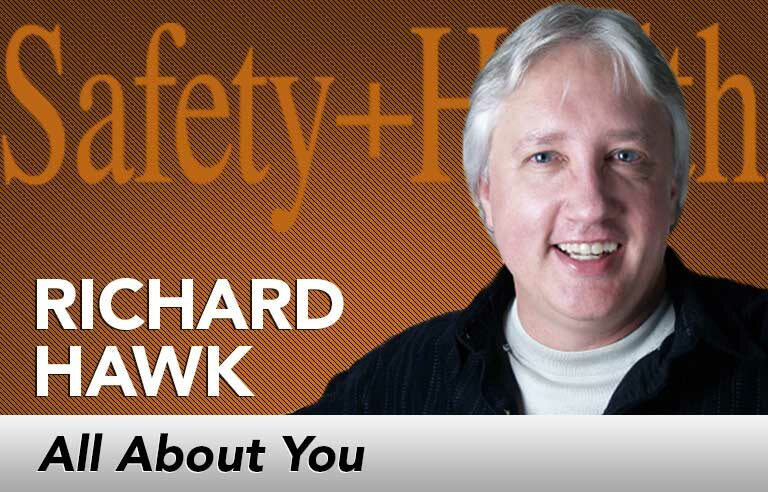All About You: Who do you think you are? Change your self-identity to improve your life

EDITOR’S NOTE: Motivating employees to work safely is part of the safety professional’s job. But who motivates the motivator? In this monthly column, veteran safety pro and professional speaker Richard Hawk offers his entertaining brand of wisdom to inspire safety pros to perform at their best.
What type of person are you? Besides your name, how do you describe yourself? Are you a healthy person? Are you a “slob” or a “neat freak,” or someone in between on the tidiness scale?
Here’s something I often hear from people I meet: “I’m good with faces, but I can’t remember names.” How we think of and describe ourselves has a strong bearing on how we act and feel. If you believe you’re a healthy person, then you probably eat well and exercise. If you believe you’re a lousy public speaker, you most likely avoid opportunities to speak before a group whenever you can.
Our best and worst habits often define who we say we are. For example, if you smoke every day, you probably label yourself “a smoker.” If you run most days, you probably consider yourself “a runner.” The list is extensive. I consider myself “a speaker,” but I’m also a father, musician, procrastinator, and many other positive and negative identities. Each of these identities influences my behavior. So, does this mean that if I change my identity beliefs I’ll change my behavior?
Yes!
I’ve stopped using goals as my main inspiration for driving my behavior. Instead, I use an identity-based model to improve my life. I’ve been familiar with this self-help concept for many years, but it congealed into something I’m using after I read “Atomic Habits” by James Clear – a book I highly recommend. Clear does a fine job of describing how to use this identity concept to create and keep new habits.
This year, partly because of Clear’s book, I’m doing something completely different than my past personal improvement efforts. First, I’m not reaching for any numbered or listed goals, such as lose 15 pounds, get a certain number of clients and talks, or spend four nights a week with my wife doing something she likes.
Instead, I’m identifying and reacting to various positive identities. Although organizations need specific goals for a variety of reasons, individuals – particularly in their personal lives – do not. Developing a system based on how you identify yourself can be a much steadier and more powerful way to improve your life than setting goals. Research has found two shortcomings of reaching for goals: a loss of inspiration once the goals are met and a lack of fulfillment before they are reached.
You can still be the best at something and aspire to win a gold medal or create financial freedom by using positive identities. And don’t think this is a quick-fix way to success. You still have to put in the time and effort. I’m not saying goals aren’t worth pursuing, but for me – after all these years of goal-striving – using this method to improve my life is a refreshing change.
Here’s how it works. List a variety of positive identity types you’d like to embody, such as a “productive professional” or “calm communicator.” Then, list what this type of person would do each day (e.g., not check Facebook constantly or keep your voice low when you’re upset). You don’t have to list every situation, and that’s part of the beauty of this method of self-improvement. You can use it actively as a way to steer your actions.
This way of improving your life creates less pressure than standard do-better techniques. If I resolve to lose 15 pounds in three months but don’t reach that goal, I’ll feel a bit defeated. On the other hand, if every day I make decisions based on being a healthy eater, I will surely lose weight. And, as long as I keep my identity in mind every time I chose a salad over a burger, I can feel a slight thrill of success.
You don’t have to trash your New Year’s resolutions. You can easily incorporate this identity technique as a complement to them. In fact, why not believe that you’re a person who always keeps their New Year’s resolutions?
This article represents the views of the author and should not be construed as a National Safety Council endorsement.
Richard Hawk helps safety professionals become better leaders through his keynotes, workshops, articles and books so they can create vibrant safety cultures. His popular “Mindfully Safe” keynote teaches employees how to focus better and improve their situational awareness, a key skill to preventing incidents. To contact Richard, visit makesafetyfun.com.
Direct to your inbox: Sign up to be notified in email about new "All About You" columns.
Listen on Soundcloud or Stitcher
Post a comment to this article
Safety+Health welcomes comments that promote respectful dialogue. Please stay on topic. Comments that contain personal attacks, profanity or abusive language – or those aggressively promoting products or services – will be removed. We reserve the right to determine which comments violate our comment policy. (Anonymous comments are welcome; merely skip the “name” field in the comment box. An email address is required but will not be included with your comment.)

